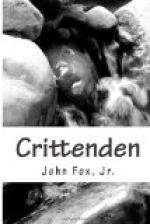Bob laughed—but it was a laugh of propitiation.
“Law, mammy. I was jes projeckin’ wid Young Cap’n.”
“Fool nigger, doan know what wah is—doan lemme heah you talk no more ’bout gwine to de wah ur I gwine to w’ar you out wid a hickory—dat’s whut I’ll do—now you min’.” She turned on Basil then; but Basil had retreated, and his laugh rang from the darkening yard. She cried after him:
“An’ doan lemme heah you puttin’ dis fool nigger up to gittin’ hisself killed by dem Cubians neither; no suh!” She was deadly serious now. “I done spanked you heap o’ times, an’ ‘tain’t so long ago, an’ you ain’ too big yit; no, suh.” The old woman’s wrath was rising higher, and Bob darted into the barn before she could turn back again to him, and a moment later darted his head, like a woodpecker, out again to see if she were gone, and grinned silently after her as she rolled angrily toward the house, scolding both Bob and Basil to herself loudly.
A song rose from the cowpens just then. Full, clear, and quivering, it seemed suddenly to still everything else into silence. In a flash, Bob’s grin settled into a look of sullen dejection, and, with his ear cocked and drinking in the song, and with his eye on the corner of the barn, he waited. From the cowpens was coming a sturdy negro girl with a bucket of foaming milk in each hand and a third balanced on her head, singing with all the strength of her lungs. In a moment she passed the corner.
“Molly—say, Molly.”
The song stopped short.
“Say, honey, wait a minute—jes a minute, won’t ye?” The milkmaid kept straight ahead, and Bob’s honeyed words soured suddenly.
“Go on, gal, think yo’self mighty fine, don’t ye? Nem’ min’!”
Molly’s nostrils swelled to their full width, and, at the top of her voice, she began again.
“Go on, nigger, but you jes wait.”
Molly sang on:
“Take up yo’ cross, oh, sinner-man.”
Before he knew it, Bob gave the response with great unction:
“Yes, Lawd.”
Then he stopped short.
“I reckon I got to break dat gal’s head some day. Yessuh; she knows whut my cross is,” and then he started slowly after her, shaking his head and, as his wont was, talking to himself.
He was still talking to himself when Basil came out to the stiles after supper to get into his buggy.
“Young Cap’n, dat gal Molly mighty nigh pesterin’ de life out o’ me. I done tol’ her I’se gwine to de wah.”
“What did she say?”
“De fool nigger—she jes laughed—she jes laughed.”
The boy, too, laughed, as he gathered the reins and the mare sprang forward.
“We’ll see—we’ll see.”
And Bob with a triumphant snort turned toward Molly’s cabin.




